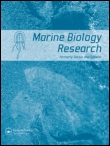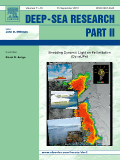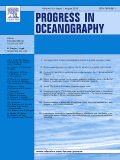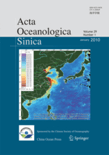
Ocean Science Journal
Scope & Guideline
Transforming Ocean Insights into Action
Introduction
Aims and Scopes
- Marine Ecology and Biodiversity:
Research on the dynamics of marine ecosystems, including species interactions, community structure, and the impacts of environmental changes on biodiversity. - Marine Biochemistry and Toxins:
Studies focusing on the chemical properties of marine organisms, including the identification and analysis of marine toxins and pollutants that affect marine life and human health. - Physical Oceanography and Climate Change:
Investigations into oceanic processes such as currents, temperature distributions, and their interactions with climate change, including the effects of marine heatwaves and acidification. - Marine Conservation and Management:
Research aimed at understanding threats to marine species and habitats, developing conservation strategies, and assessing the effectiveness of management practices. - Remote Sensing and Marine Technology:
Utilization of advanced technologies such as satellite imagery and autonomous systems for monitoring marine environments, assessing ecological changes, and improving data collection methods.
Trending and Emerging
- Impact of Climate Change on Marine Systems:
There is a growing focus on understanding how climate change affects marine ecosystems, species distributions, and biogeochemical cycles, emphasizing the need for urgent research on adaptation and resilience. - Marine Pollution and Microplastics:
Research addressing the prevalence and effects of microplastics and other pollutants in marine environments is on the rise, reflecting increasing public and scientific concern about marine health. - Technological Innovations in Marine Research:
The integration of new technologies such as machine learning, remote sensing, and autonomous monitoring systems is emerging as a critical area of research, enhancing the ability to study and manage complex marine environments. - Marine Ecosystem Services and Human Well-being:
Studies exploring the connections between marine ecosystems and human benefits are gaining traction, focusing on the valuation of ecosystem services and their implications for policy and management. - Invasive Species and Biodiversity Loss:
The impact of invasive species on native marine biodiversity is becoming a significant research theme, highlighting the need for effective management strategies to mitigate their effects.
Declining or Waning
- Traditional Fisheries Management:
Topics related to conventional fisheries management strategies are increasingly overshadowed by more advanced ecological and technological approaches, reflecting a shift towards sustainable practices and ecosystem-based management. - Static Habitat Studies:
Research focused solely on static habitats without considering dynamic interactions and changes over time is becoming less prominent, as studies increasingly adopt a more holistic view of marine ecosystems. - Historical Ecology without Modern Context:
While historical ecological studies remain important, there is a noticeable decline in papers that do not integrate modern data, technologies, or methodologies, as the field moves towards more relevant and applicable research.
Similar Journals

MARINE AND FRESHWATER RESEARCH
Bridging science and environmental stewardship.Marine and Freshwater Research is a prestigious journal published by CSIRO PUBLISHING that serves as a key platform for the dissemination of cutting-edge research in the fields of Aquatic Science, Ecology, and Oceanography. With an impactful presence since its inception in 1948, the journal provides critical insights into the dynamics of freshwater and marine ecosystems, promoting interdisciplinary approaches that contribute to our understanding of biodiversity and sustainability. Currently ranked in the Q2 category across major scientific domains, including Ecology and Aquatic Science, it enjoys a robust academic reputation supported by impressive Scopus rankings, such as Rank #66/247 in Aquatic Science and Rank #44/145 in Oceanography, reflecting its high citation impact and relevance. While offering a subscription-based access model, the journal remains dedicated to fostering dialogue and innovation within the scientific community, aiming to bridge the gap between research findings and practical applications in environmental management. Located in Australia, Marine and Freshwater Research is an essential resource for researchers, professionals, and students dedicated to exploring the complexities of aquatic ecosystems and advocating for their preservation.

MARINE ORNITHOLOGY
Unveiling the Wonders of Seabirds and Their HabitatsMarine Ornithology, published by the Pacific Seabird Group, is a vital resource in the field of animal science, zoology, and oceanography. With an ISSN of 1018-3337 and E-ISSN of 2074-1235, this journal has been a cornerstone for researchers and enthusiasts since its inception, actively contributing to the understanding of marine bird species and their ecosystems. Although it is currently not an open-access journal, it provides critical insights and findings that inform both academic research and practical conservation efforts. With its category quartiles positioned in Q3 for both Animal Science and Zoology, and Oceanography, Marine Ornithology occupies a significant, albeit competitive niche among scholarly publications. Researchers can benefit from its comprehensive coverage of marine avian studies, which is crucial for addressing the challenges these species face in changing oceanic environments. As the journal continues to evolve, with coverage from 1990 to 2024, it maintains an essential role in enriching our knowledge of marine biodiversity.

Marine Biology Research
Exploring the depths of aquatic knowledge.Marine Biology Research is a premier journal published by Taylor & Francis, focusing on the dynamic field of marine biology and its intersecting realms of aquatic science, ecology, and oceanography. Since its inception in 2005, this journal has served as a crucial platform for researchers and professionals to disseminate their findings, with a vision extending to 2024 and beyond. The journal is recognized with a Q3 quartile ranking in both Aquatic Science and Ecology, Evolution, Behavior and Systematics, underscoring its growing influence in these fields as evidenced by its Scopus rankings. Located in the United Kingdom, Marine Biology Research aims to foster collaboration and innovation through open access options, facilitating knowledge exchange among the academic community. With a steady commitment to advancing marine sciences, this journal is an invaluable resource for those dedicated to understanding and preserving our ocean ecosystems.

DEEP-SEA RESEARCH PART II-TOPICAL STUDIES IN OCEANOGRAPHY
Unveiling the Mysteries of Our OceansDEEP-SEA RESEARCH PART II-TOPICAL STUDIES IN OCEANOGRAPHY is a leading journal in the field of oceanography, published by PERGAMON-ELSEVIER SCIENCE LTD. With an impressive ranking of Q1 in Oceanography and holding the 20th position out of 145 journals in the Earth and Planetary Sciences category, this journal provides a prominent platform for researchers and practitioners alike. Covering topical studies in oceanography since its inception in 1993, it continues to contribute significant insights into deep-sea research, enhancing our understanding of marine environments. Although the journal does not presently offer Open Access options, it remains a vital resource, appealing to students and professionals who seek to engage with innovative research and practical applications in the oceanographic community. The journal's ongoing commitment to excellence is evident as it plays a crucial role in advancing the field leading up to the present day and beyond.

Indian Journal of Geo-Marine Sciences
Unveiling the Secrets of Oceanography and GeosciencesThe Indian Journal of Geo-Marine Sciences, published by the NATIONAL INSTITUTE OF SCIENCE COMMUNICATION & INFORMATICS (NISCAIR), serves as a vital platform dedicated to the dissemination and advancement of knowledge in the field of marine and geosciences. As an open-access journal, it allows for improved visibility and accessibility of research findings to a global audience, enabling researchers, professionals, and students to share insights into oceanography and related disciplines. With a publication history spanning from 2007 to 2010 and continuing from 2012 to 2024, it has established itself within the academic community as a reliable source of innovative research, despite being classified in Q4 of Oceanography and holding a Scopus rank that places it in the 27th percentile. This journal is particularly relevant for those investigating marine ecosystems, geological oceanography, and their interconnections, thus playing an essential role in fostering understanding and communication within this important area of scientific inquiry.

OCEANOLOGY
Illuminating the Mysteries of the OceanOCEANOLOGY is a distinguished journal published by Pleiades Publishing Inc that has been a pivotal platform for advancing knowledge in the field of oceanography since its inception. With an ISSN of 0001-4370 and E-ISSN 1531-8508, this journal covers a range of topics related to marine sciences, geographical oceanography, and environmental studies, providing insights and research that significantly contribute to our understanding of oceanic systems. Recognized for its academic rigor, OCEANOLOGY holds a Q3 quartile ranking in the Oceanography category as of 2023, reflecting its impact within the scientific community as evidenced by its Scopus rank of 85 out of 145. Although currently not an open-access journal, OCEANOLOGY remains essential for researchers, professionals, and students by offering a comprehensive collection of peer-reviewed articles. This multidisciplinary approach equips its audience with valuable data and perspectives critical for ongoing research and development in ocean-related fields.

Oceans-Switzerland
Unlocking the Secrets of Ocean ProcessesOceans-Switzerland, published by MDPI, is an esteemed open-access journal established in 2020, with a focus on providing a platform for the dissemination of high-quality research in the fields of Environmental Science and Oceanography. Based in the picturesque city of Basel, Switzerland, the journal seeks to foster a deeper understanding of oceanic processes and their implications for the environment through rigorous peer-reviewed articles. With an impact factor reflected in its 2023 Scopus rankings, placing it in the 56th percentile across its categories, Oceans-Switzerland continues to promote interdisciplinary collaboration and innovation, targeting a wide audience of researchers, professionals, and students keen on exploring the complexities of ocean systems. The journal's commitment to open-access policy ensures that groundbreaking research is available to a global audience, reinforcing its crucial role in advancing knowledge and shaping practices within the scientific community.

PROGRESS IN OCEANOGRAPHY
Exploring the Depths of Ocean SciencePROGRESS IN OCEANOGRAPHY is a pivotal journal published by PERGAMON-ELSEVIER SCIENCE LTD, dedicated to advancing the field of oceanographic research and exploration. With an ISSN of 0079-6611 and an E-ISSN of 1873-4472, this esteemed publication has been disseminating significant findings from 1963 and continues to be a cornerstone in aquatic sciences and geology, holding a distinguished Q1 ranking in both categories as of 2023. The journal primarily focuses on innovative research that contributes to our understanding of ocean processes, marine ecosystems, and the impact of human activities on the oceans. Its exclusive access model facilitates the dissemination of high-quality content that resonates with researchers, professionals, and students alike, ensuring that vital insights are accessible to the global scientific community. With a firm commitment to upholding rigorous scientific standards, PROGRESS IN OCEANOGRAPHY remains an influential platform for the communication of groundbreaking research, providing scholars with invaluable resources to drive future oceanographic studies.

Jurnal Ilmu dan Teknologi Kelautan Tropis
Advancing tropical marine science for a sustainable future.Jurnal Ilmu dan Teknologi Kelautan Tropis (ISSN: 2087-9423, E-ISSN: 2085-6695) is a premier scientific journal published by the Indonesian Oceanologists Association in collaboration with the Bogor Agricultural University, specifically from the Department of Marine Science and Technology. This journal is committed to advancing the field of tropical marine science, publishing high-quality research that addresses pressing issues in oceanography, marine ecosystems, and sustainable practices in tropical regions. By facilitating open access to valuable scientific knowledge, Jurnal Ilmu dan Teknologi Kelautan Tropis aims to engage researchers, professionals, and students alike, fostering collaboration and innovation in marine research. Located in the picturesque region of Bogor, West Java, Indonesia, this journal serves as a vital platform for disseminating findings that contribute to the conservation and effective management of tropical marine resources.

ACTA OCEANOLOGICA SINICA
Advancing Oceanographic Knowledge Since 1985ACTA OCEANOLOGICA SINICA, published by SPRINGER, stands as a significant voice in the fields of Aquatic Science and Oceanography, contributing vital research and insights since its inception in 1985. With an ISSN of 0253-505X and an E-ISSN of 1869-1099, this journal maintains a strong international focus, delivering high-quality peer-reviewed articles that address pressing marine and freshwater environmental issues. Although it operates under a subscription model, its Q3 ranking in both Aquatic Science and Oceanography demonstrates its solid standing within Scopus, placing it in the 48th and 44th percentiles respectively. The journal aims to foster knowledge exchange and collaboration among researchers, professionals, and students by providing a platform for innovative studies and comprehensive reviews. With a dedicated editorial board and a commitment to advancing scientific understanding, ACTA OCEANOLOGICA SINICA serves as an essential resource for anyone engaged in the study of oceanographic phenomena and aquatic ecosystems.